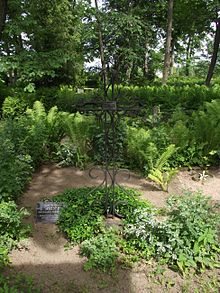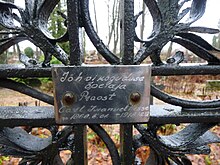Carl Immanuel Philipp Hesse
Carl Philipp Emmanuel Hesse (born September 1, jul. / September 13, 1875 greg. In the pastorate of Sangaste , Governorate of Livonia , Russian Empire ; † December 18, 1918 greg. In Castle Wrangelstein in Viru , Estonia ), and Karl Immanuel Hesse wrote , was a German-Baltic pastor . He is considered a Protestant martyr and is recorded on the Riga Martyrs Stone.
Life
Family, youth and education
Carl Immanuel Hesse was born as the sixth son of pastor Theodor Heinrich Renatus Hesse (1837-1927) and Wilhelmine Catharina Elisabeth Hesse (1840-1913). Johannes Hesse , Hermann Hesse's father , was his uncle. His older brothers were Eduard Alexander Hesse (1865–1930), Robert Balthasar Hesse (1866–1875), Albert Freimund Daniel Hesse (1869–1941) and Herman Felix Hesse (* 1872), his older sister Elisabeth Sophie Hesse (1867–1881 ); so he had numerous siblings.
Carl Immanuel Hesse received thorough instruction in the pastorate's "house school". Then he attended high school, followed by his studies. On Sunday May 30th Jul. / June 12, 1904 greg. , he was ordained in the town church in Viljandi .
Carl Immanuel Hesse was married to Magdalene Aline, née Lemm (1876–1944).
Pastor in Jõhvi
After his vicariate Immanuel Hesse was on June 14th jul. / June 27, 1907 greg. as the successor of Th. Christophs elected pastor of Jõhvi (German: Jewe) with ten against seven votes . Opposing candidates were the German-Baltic Pastor Paucker and the Estonian Pastor Jalajast. The Estonian pastors Steinberg, Sitska and Mohrfeld withdrew their candidacy before the election.
In July the consistory was asked by some of the church guardians to cancel the election. One reason was that one vote was cast in writing without a signature, another was the exclusion of the Sophienhof estate from the election. The estate belonged to farmers, but paid all church taxes and met all obligations. The consistory was advised that it could damage the life of faith if the pastor were appointed against the will of the congregation. The unsigned vote, however, was directed against Hesse and was only accepted after a corresponding vote by the Convention.
On Sunday November 11th Jul. / November 24th, 1907 greg. , Hesse's inauguration finally took place, which took place in a well-filled church without incident. Before the service he received a silver honorary gift from the Estonian church guardians. This indicated that even in the short time before his inauguration, Hesse was able to build up a good relationship with his community despite the irregularities in the election, although he was considered rhetorically untalented.
At first he was very humorous, but the increasing work for the large community with 13,000 members formed him into a happy, but rather quiet person who radiated a great deal of seriousness.
In September 1909 he gave a German and an Estonian address at the funeral of the former Knighthood Secretary Harald Baron Toll in Tallinn .
On January 7th, July / January 20, 1910 greg. he became the father of Irene Hesse (married Paulsen; † 1990), on September 23rd jul. / October 6, 1911 greg. by Walter Hesse, on July 26th jul. / August 8, 1913 greg. by Herbert Hesse and on May 11th jul. / May 24, 1917 greg. by Erich Hesse († 1979).
Exile and attempted attack
Immanuel Hesse's pastoral work was successful, so his sudden exile to Siberia in 1915, during the First World War , seemed unexpected. Nine other Estonian pastors shared his fate. Allegedly they had received donations for the Leipzig mission in warring Germany. After nine months they were allowed to return; the exile was officially described as an "accident".
Shortly after the pastors returned, the February 1917 Revolution broke out, which also affected Jõhvi. This led to house searches in the pastorate. They looked for weapons and images of the emperors. Old depictions of church patrons in the church building were destroyed.
A momentous incident happened when a large group was confirmed in the spring of 1918. A 21-year-old laughed at the blessing, which is why the pastor excluded him from the sacrament. The young man was offended; there were several plans for revenge. An attempted attack on Hesse was made during a long drive to a distant farm where a wedding was taking place. The plan to intercept the pastor on the way back, however, failed because he was warned and returned by a different route.
On March 1, 1918, Jõhvis was occupied by the Germans. This prevented communist-motivated attacks for a certain time.
On November 29th the German troops were withdrawn.
Escape
During the Estonian War of Freedom that followed , the Red Army occupied Narva (German: Narwa). It was now only a matter of time before she invaded Jõhvi as well. In this situation, Immanuel Hesse brought his wife and four young children to safety on a remote farm.
He himself went back to the pastorate and gave the sermon on the following day, the first Sunday in Advent. Then he went to an estate to motivate the residents to evacuate. Then he helped a needy refugee family. Only after these activities did he return to his family. On the way he felt the effects of the October Revolution: He was no longer greeted, but abused by many as a German. When he reached the farm that housed his family, the farmer said that he could no longer give them shelter, otherwise he would endanger his farm too much.
The pastor then went to the neighboring church with his family. There he was accepted by an old teacher. In this remote place he could enjoy the company of his family for another 2½ weeks. What was said about what was going on in the area seemed more and more threatening, especially for his wife. On the last evening he spent here, he prayed together with her words from Psalm 27 ( Ps 27 : 1-14 LUT ): "The Lord is my light and my salvation ..." and, in addition:
"And if it can be, save us from a quick death."
Hesse's wife later reported that he had shown no fear, but was fully aware of the danger he was in. The next morning Hesse said:
"Thank God, another quiet night."
Violent death
A little later, Estonian Red Army soldiers came to arrest Immanuel Hesse. The former confirmand mentioned above had revealed where Hesse could be found. The pastor had two hours to sort out his affairs. Hesse celebrated the Lord's Supper one last time, together with his wife. He then asked her to read him again Psalm 27 because he feared that the Bolsheviks might ask him to renounce his faith. Then he said goodbye to his family.
Hesse was brought to Wrangelstein Castle, 10 km away and used as the headquarters of the Bolsheviks. His host, the teacher, was also brought to the castle, but was released the same evening so that he could report how the pastor was mocked: “You have come here to give us the Lord's Supper?” It followed Interrogation of Hesse. A record later found accused him of having fled the Red Army, exposing him as a counterrevolutionary .
According to an oral report, Carl Immanuel Hesse was supposed to have been asked to sign a statement calling everything he had ever preached a lie. Hesse is said to have refused, tore up the statement and threw it at the judge's feet. Further sources on this incident are lacking because logs were kept very superficial, if at all. What is certain, however, is that his eyes were gouged out, which suggests that a very unusual incident must have occurred during the interrogation: The occupation by the Bolsheviks cost the lives or at least their health of countless alleged counter-revolutionaries, but Hesse was that Only one who was mutilated in this way.
The next night, Carl Immanuel Philipp Hesse was shot dead on a river bank at dawn. The aforementioned ex-confirmand, who died a little later in the battle, also took part in the shooting. Oskar Schabert commented on the events of Hesse in his Baltic Martyrs Book with Psalm 27, verse 13: "But I do believe that I will see the good of the Lord in the land of the living."
literature
- Oskar Schabert: Baltic Martyrs Book , Furche-Verlag. Berlin 1926. P. 70 ff. The report is based on the notes of Hesse's wife Magdalene Aline Hesse, née Lemm.
- Harald Schultze and Andreas Kurschat (editors): "Your end looks at ..." - Protestant martyrs of the 20th century. Evangelische Verlagsanstalt, Leipzig 2006, ISBN 978-3-374-02370-7 , Part II, Section Russian Empire / Baltic States , p. 537.
Individual evidence
- ↑ Fellin. The ordination in the Düna newspaper , no. 124, June 4th jul. / June 17, 1904 greg. , online at Hesse | issueType: P
- ↑ Jewe. Election of pastors. in the Düna-Zeitung , No. 140, June 20, Jul. 3rd / 3rd July 1907 greg. , online at Hesse | issueType: P
- ↑ Jewe. Pastor Hesse in the Rigaschen Zeitung , No. 138, June 18th jul. / July 1, 1907 greg. , online at Hesse | issueType: P
- ^ Estonia. Hate speech. in Riga's Rundschau , # 168., July 23 jul. / August 5, 1907 greg. , online at Pastor Hesse | issueType: P
- ^ Estonia. Introduction. in the Düna newspaper , No. 272, November 22nd July / December 5, 1907 greg. , online at Hesse Pastor Hesse | issueType: P
- ^ Reval. The funeral of the cause. Knighthood Secretary, Harald Baron Toll, in the Düna-Zeitung , No. 224, 29 September July. / October 12, 1909 greg. , online at Hesse | issueType: P
- ↑ Claus von Aderkas : The testimony of the Baltic martyrs in the years 1918/1919 in: Günther Schulz (editor): Church in the East , Volume 39, 1996, Vandenhoeck & Ruprecht, Göttingen 1996, ISBN 3-525-56385-X , p 24
- ^ Burchard Lieberg: From the life of the Ev.-Luth. Church of Estonia in: Günther Schulz (editor): Church in the East , volumes 42-43, 1999-2000, Vandenhoeck & Ruprecht, Göttingen 2000, ISBN 3-525-56396-5 , p. 138
- ^ Oskar Schabert: Baltic Martyrs Book , Furche-Verlag. Berlin 1926. p. 73.
Web links
| personal data | |
|---|---|
| SURNAME | Hesse, Carl Immanuel Philipp |
| ALTERNATIVE NAMES | Hesse, Carl Immanuel; Hesse, Karl Immanuel |
| BRIEF DESCRIPTION | Evangelical Lutheran pastor, martyr in Estonia |
| DATE OF BIRTH | September 13, 1875 |
| PLACE OF BIRTH | Sangaste |
| DATE OF DEATH | December 18, 1918 |
| Place of death | Wrangelstein Castle , Virumaa |








